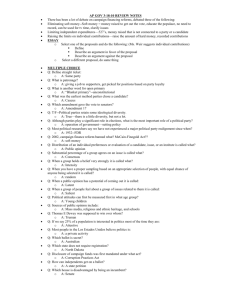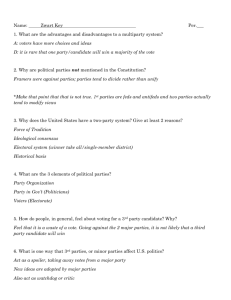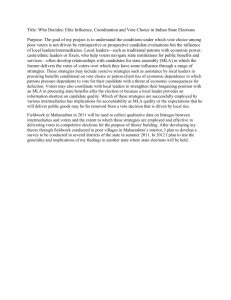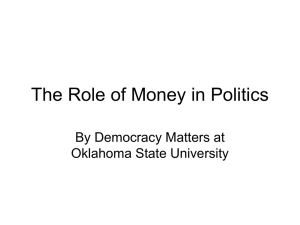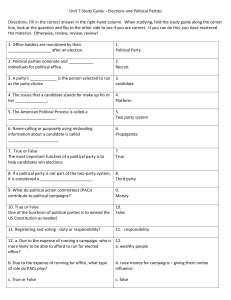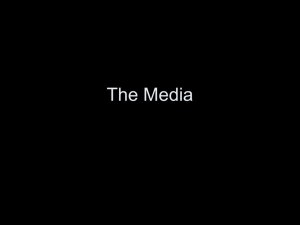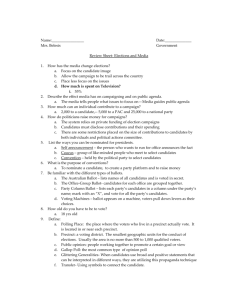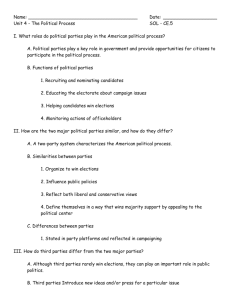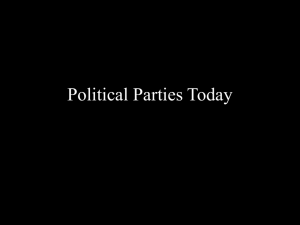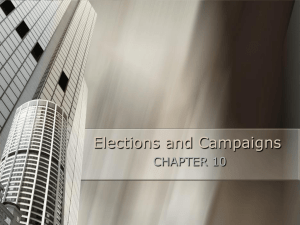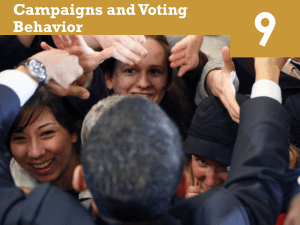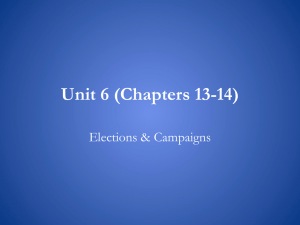Political campaigns
advertisement
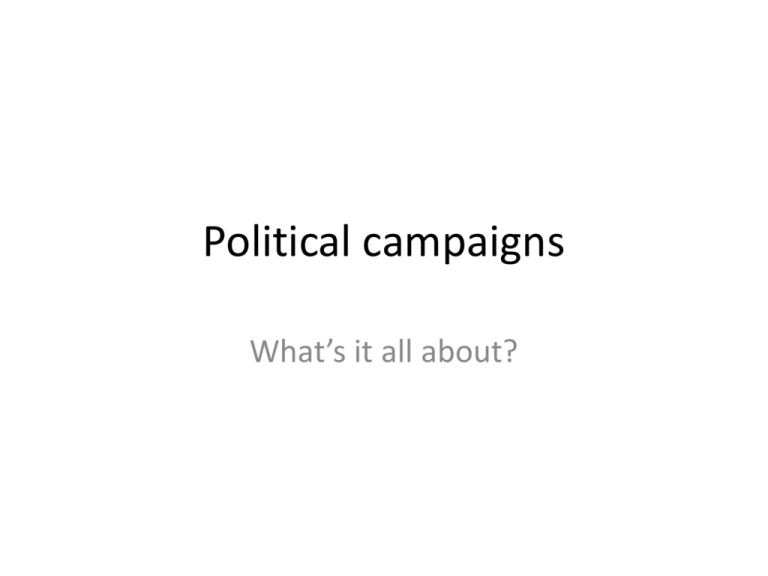
Political campaigns What’s it all about? What are elections for? • To determine who will hold governmental positions – Not all positions • To maintain public control over the government – Throw the rascals out • To re-legitimize the system and the regime – Government claim to consent of the governed – Elections as rituals What are campaigns for? • To inform the public of what the government has been doing and to critique the performance of officials • To stir up excitement for the system, and for politics in general • To inform officials of the preferences of the electorate and to set priorities for action – Agenda setting Do elections do what they are supposed to do? • Many examples of politicians who have been found guilty of crimes were returned to office. • Candidates who are in other ways unfit are returned to office – Candidates who are at death’s door, etc. Do elections do what they are supposed to? • Incumbency determines – Since World War II, 92% of incumbents who ran for reelection were successful. (Wikipedia) • However, high-quality challengers are not always available • Incumbents with serious problems may not run again Advantages incumbent Congresspersons hold • Experience – an incumbent by definition is experienced. He or she has already won at least one election. • Franking – congressional privilege that allows congresspersons to send out mail to their constituents for free. It’s in the Constitution. • Free Media – local media like covering congressman. Furthermore, they can go on national TV shows, they have an office in Washington that can create media releases. • Money – congressmen bring federal spending into their local areas to benefit the district (which thus increases goodwill in the district for them). • Casework – when individual constituents have a problem and call their congressman. It’s an easy, non-controversial way of making voters happy. People helped (no matter what party) will be more likely to vote for him and they will tell their friends. • Campaign finance – officeholders have a big advantage over challengers because they are already in congress with a vote over legislation and thus interest groups will attempt to influence them (whatever their party). – Wikipedia Election outcomes • There are at least some scholars that argue that the outcome of elections does not seem to reflect public opinion – Candidates are elected that appear to oppose majority opinion on a wide range of topics – Decisions based on emotion and/or peripheral issues rather than rational self-interest, which is supposed to rule Do campaigns do what they are supposed to do? • Voters rarely know very much about most of the candidates on the ballot – Name recognition may determine winners • Even when they are acquainted with candidates voters often do not know much about those seeking office – Few can actually identify candidate background, issue positions, etc. • False beliefs common – Assume policy agreement where none exists Information gain • A great deal of research indicates that members of the electorate gain only limited information about candidates during the campaign – (Leshner, Benoit and Hansen) • Much of what the public learns is questionable, inaccurate or biased • Focus is often on peripheral cues rather than issues – Physical attractiveness, speaking tone, height Information gain • Biased reception – The same information gained about a favored candidate and a disfavored candidate would be interpreted differently Vote intention • Traditionally, there has been little change in vote intent during the campaign – Most people’s votes can be predicted from demographic information prior to the beginning of the campaign Content of campaign communications • • • • • Distortion, untruth Images and symbolism Propaganda techniques Hoopla How could anyone make an intelligent decision based on all this junk? Politics as marketing • The candidate is the ‘product’ – What are the ‘attributes’ of the candidate? • A one-day ‘sale’ – Date is predetermined • The monetary ‘price’ is zero • Far more competitive/antagonistic environ than most ‘products’ Marketing strategy and political campaigns • Goal is to win • Use methods developed for marketing branded products • Historical transition from product orientation to sales orientation to marketing orientation Marketing strategy • Image/positioning – Limited by prior performance of candidate • Market research – Polling • Targeting – “Two campaigns” – Likely voters – Persuadable groups • Communication channels – Interpersonal – Mediated – New media • Message – “Product attributes” – Critique of opposition (far more prevalent in political campaigns) • Fundraising • PR – ‘Earned media’ – Press relations • Development of organization – Pre-existing organization in traditional marketing campaigns • GOTV Image Targeting • Primaries v. general election • Voters v. non-voters – Talking to those who vote – Convincing those who are supportive to go to the polls • • • • Demographics Persuasibility Accessibility Popular vote v. electoral college – Gore won popular vote – Plouffe analysis Communication channels • Interpersonal – Face-to-face • Too time-consuming for major elected office • Still the main means for local – Public meetings – Speeches at gatherings – Debates • Media – TV ads still most significant • Lion’s share of campaign budgets in higher office – Radio important for targeting • Latino – Newspapers mainly for elite • New media – Growing importance – Innovative area – Microtargeting Message • • • • Issue “Character” Positive v. negative tone Issues of distortion, dishonesty Fundraising • Classic model – PACs – Large donors, dinners, etc. – Large portion of candidate’s time personally soliciting donations • Concern over undue influence • New model – Obama • Vast numbers of small donors/Internet • Public funding (McCain/Feingold) – Limits on spending • Other groups – 527 groups PR • Media relations are tremendously important – Spin • Interaction with candidate • Supporters providing press with background, etc. • On-air pundits • Non-news media Development of organization • Obama v. Clinton – Mass volunteer organizations – Early preparation – Online organizing GOTV • • • • Phone reminders Transporting likely supporters to the polls Registering potential voters Tracking supporters
